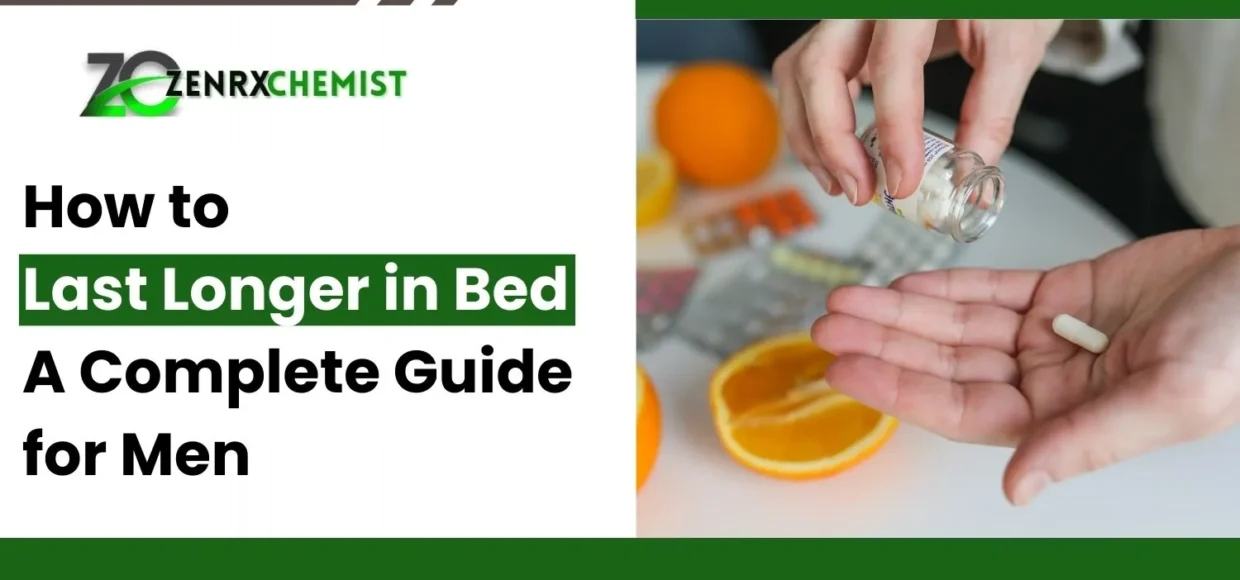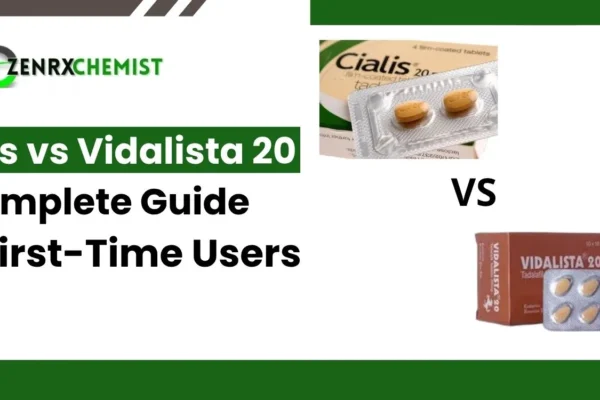Blog
How to Last Longer in Bed: A Complete Guide for Men
Sexual stamina is a major concern for many men, yet it’s still often surrounded by silence and stigma. Most men who experience premature ejaculation (PE) feel embarrassed, frustrated, or anxious — often affecting their self-esteem and intimate relationships.
The good news is, premature ejaculation and erectile dysfunction are medically recognized and treatable conditions.
This guide provides a clinical yet approachable look at the causes, solutions, and techniques for preventing premature ejaculation, improving sexual performance, and addressing related concerns.
What is Sexual Stamina and Ejaculation
Sexual stamina refers to a man’s ability to sustain penetrative sex before reaching orgasm. The process of ejaculation is complex and involves coordination between the central nervous system (CNS), sympathetic nervous system, and reproductive system. In men with PE, ejaculation occurs sooner than desired, often within a minute of sexual intercourse, and may happen before or shortly after penetration.
Ejaculation typically occurs in two phases:
- Emission phase: Seminal fluid is moved into the urethra.
- Ejaculation phase: Semen is forcefully expelled due to rhythmic contractions.
If this reflex arc is overly sensitive, it can lead to early ejaculation, despite attempts at control.
What’s Considered “Normal” Duration During Sex?
According to a study published in the Journal of Sexual Medicine, the average time for penetrative sex (vaginal intercourse) is approximately 5.4 minutes, though this can vary widely.
The International Society for Sexual Medicine (ISSM) defines premature ejaculation (PE) as:
- Ejaculation that always or nearly always occurs within one minute of vaginal penetration.
- Inability to delay ejaculation during sexual activities in nearly all cases.
- Negative personal consequences, such as performance anxiety, stress, or relationship issues.
Men who experience premature ejaculation frequently should consider it a medical condition, not just a performance issue.
Common Causes of Finishing Too Early
PE can be either primary (lifelong) or secondary (acquired). Common causes include:
- Neurobiological factors: Hypersensitivity of the penile glans or hyperactive ejaculatory reflex.
- Hormonal imbalances: Abnormal levels of testosterone, oxytocin, or thyroid hormones.
- Psychological causes: Performance anxiety, depression, or early sexual conditioning.
- Erectile dysfunction (ED): Often coexists with PE, complicating treatment.
- Inflammation or infection: Of the prostate or urethra.
Natural Techniques to Help You Last Longer in Bed
Several non-pharmacological strategies can improve control over ejaculation. These methods are often recommended before resorting to medication.
1. Pelvic Floor Exercises (Kegels) for Sexual Control
Strengthening the pelvic floor muscles can significantly improve ejaculatory control. These muscles play a crucial role during the ejaculation process.
- Kegel exercises target the pubococcygeus muscle, helping men control the release of semen.
- Regular Kegel routines can help treat both premature ejaculation and mild erectile dysfunction.
2. The Role of Foreplay and Communication
Engaging in prolonged foreplay, including oral sex, helps desensitize the arousal threshold.
- Communicating with your partner about arousal levels can allow for better pacing.
- Alternating between stimulation and pause helps reduce anxiety and extend duration.
3. Best Positions to Improve Sexual Endurance
Positions that reduce physical stimulation can help delay ejaculation:
- Man-on-top or missionary allows better control.
- Side-lying or spooning positions offer slower movement.
- Avoid highly stimulating positions if you’re prone to PE.
4. When and How to Use the Start-Stop Method
The start-stop technique involves stimulating the penis until nearing climax, stopping for 30 seconds, then restarting.
- Repeat this 3–4 times per session.
- Over time, this retrains your ejaculatory reflex and builds tolerance.
5. The Squeeze Technique: Does It Really Work?
This technique involves gently squeezing the penis just below the glans to momentarily reduce arousal.
- Often used with the start technique for stronger results.
- Best performed by a partner for coordinated control.
Note: Some men find the technique difficult or uncomfortable, and results may vary.
5. Safe Delay Sprays, Creams, and Condoms: What to Know
Numbing creams and sprays contain lidocaine or benzocaine to reduce penile sensitivity.
- Effective for many, but can transfer to the partner if not washed off.
- Delay condoms also include these agents to reduce sensation during penetrative sex.
Always follow application instructions to avoid excessive numbing or irritation.
6. Prescription Medications: Options and Side Effects
If natural techniques aren’t effective, medical therapy can help.
Selective Serotonin Reuptake Inhibitors (SSRIs)
- Paroxetine, sertraline, and fluoxetine are often prescribed off-label.
- These delay ejaculation by increasing serotonin levels in the brain.
- Side effects may include nausea, fatigue, or reduced libido.
Topical anesthetics
- Lidocaine-prilocaine sprays (e.g., EMLA) are FDA-approved for PE.
- Quick-acting and localized with fewer systemic effects.
Sildenafil Citrate
- Although primarily for ED, Sildenafil Citrate can improve confidence and control in men with coexisting PE and ED.
- It enhances blood flow and prolongs erection, allowing men more time before climax.
Always consult a urologist before starting any prescription.
When to See a Doctor or Sex Therapist
You should seek professional help if:
- PE affects your relationships or mental health.
- You’ve tried techniques without success.
- You suspect a hormonal or medical issue.
A urologist or sex therapist can assess both physical and psychological factors, including performing hormone testing, ultrasound, or counseling.
How to Talk to Your Partner About Lasting Longer
Honest communication helps reduce pressure and shame.
- Reassure your partner that you’re addressing the issue.
- Involve them in foreplay and techniques like the squeeze technique or stop-start techniques.
- Let them know it’s not about dissatisfaction but about improving shared experiences.
Final Thoughts
Premature ejaculation is a common but treatable condition. With the right combination of pelvic floor exercises, psychological techniques, medical therapies like SSRIs or Sildenafil Citrate, and open communication, men can regain confidence and control in the bedroom.
Addressing sexual health should never be seen as a weakness — it’s an essential part of overall well-being. If you or someone you know continues to experience premature ejaculation, reach out to a medical professional. Help is available, and recovery is possible.







